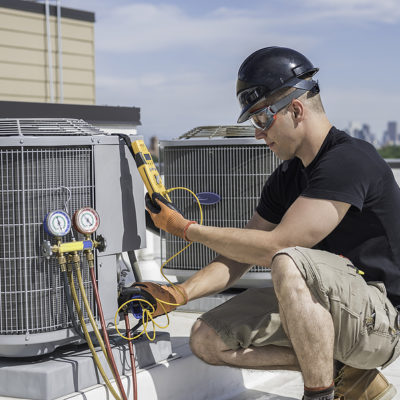When inspecting your AC system, you should look for signs of corrosion. AC systems contain many parts. If a part is made of metal – or if it contains metal – it may corrode.
Corrosion occurs when metal is exposed to oxygen. Oxygen in the air or moisture can trigger this chemical reaction. Here are a few ways corrosion can affect your AC system.
Refrigerant Leak
Your AC system may leak refrigerant if it suffers from corrosion. Corrosion can occur with just about any metal part, including refrigerant lines. Refrigerant lines are typically made of copper. While copper is immune to rusting, it can still corrode.
Corroded refrigerant lines are prone to leaking. As corrosion eats through a refrigerant line, it may cause refrigerant to slowly leak out of your AC system.
Electrical Failure
Corrosion can cause electrical failure. Your AC system is powered by electricity. The blower and the condenser fan both require electricity. Corrosion can prevent these parts from functioning properly.
As corrosion settles in, electricity may fail to reach the blower or condenser fan. Corrosion isn’t conductive. If corrosion forms between a power source and an electrically powered part, it will break the circuit. As a result, the part won’t turn on.
Loss of Coil Efficiency
Another impact of corrosion is the loss of coil efficiency. Coils are heat exchangers. Your AC system has two coils, which it uses to transfer heat while subsequently cooling your home.
Corrosion can build up on these coils. Even if it doesn’t go all the way through the coils, corrosion is still a problem. As it accumulates on a coil, it will restrict the coil’s ability to transfer heat.
Clogged Condensate Drain
Corrosion can even lead to a clogged condensate drain. The condensate drain is a drainage pipe found near the evaporator coil. It allows condensation to safely drain to your home’s exterior. Condensate drains, however, can become clogged with corroded metal.
Most condensate drains are made of PVC or a similar polymer material. Therefore, they are protected from corrosion. But condensate drains can still become clogged with pieces of corroded metal.
Condensate drain pans can corrode as they are typically made of metal. As the condensate drain pain corrodes, it may release small pieces of metal that clog the condensate drain.
If you are experiencing a problem with your air conditioning or heating call us at 512-336-1431 to schedule an appointment. We’ll be glad to come out and take a look at the issue.
1431-183 A/C & Heating proudly serves Round Rock, Georgetown, Cedar Park, Pflugerville, Leander, Liberty Hill, and North Austin.

